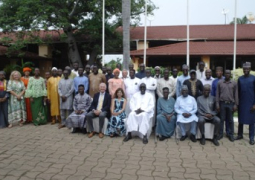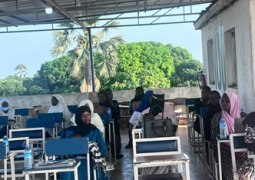
Nfansu Bojang made this remarks at the start of a 5-day continental workshop on the development of a template on economic regulation for African States at the Sir Dawda Kairaba Jawara Conference Center.
The workshop hosted by the Gambia Civil Aviation Authority (GCAA) is being organised by the African Civil Aviation Commission (AFCAC). It seeks to build the capacities of relevant personnel of the ICAO member states to enable them develop an economic regulation template for member states to adapt and implement in order to boost economic oversight of the aviation industry.
It came against the backdrop of lack of adequate economic regulations in most African states leading to weak economic oversight which greatly inhibits sustainable development of air transport in Africa, the consequencies of which include poor air connectivity and high cost of air travel, among others.
DG Bojang stated that the workshop could not have come at a better time than now when the continent champions the successful implementation of African Continental Free Trade Area and the Single Africa Air Transport Market which are part of African Union agenda 2063.
The flagship projects, he added, will not fully succeed without economic regulation, and as such the Gambia will continue to take a leading role in the enhancement of economic oversight in Africa.
Dr. Paul Ganemtore, a representative of the African Union Commission, said they expect that the development of a template on economic regulation for African States would contribute to increased awareness and capacity building as well as a better domestication and harmonisation of the legal instrument.
Angeline Sumana, Director of Air Transport at Africa Civil Aviation Commission said the weak economic oversight among member states presents susbtantial challenges to the sustainable development of air transport in Africa.
Ms Sumana added that the situation has continued to slow the pace of the air transport industry development, resulting in poor connectivity, high cost of operations, travels, among others.
“This excessive and unfair taxation has a negative impact on the economic and social benefits generated by air transport,” she also said.
She noted that AFCAC will continue to play the role of supervising and managing Africa’s aviation aganda and specially continue to build capacity of experts in members states in order to increase knowledge and awareness on ICAO policies and guidance materials, improve and harmonise the economic regulatory practices of member states under the single Africa Air Transport market and create a better operating environment for all stakeholders for sustainable development of Air Transport in the African region
Peter Alawani, regional director of International Civil Aviation Organisation (ICAO) West and Central Africa office said while significant impact have been made in terms of safety, environment, and other areas of security, they still find it difficult to have a harmonised approach in the areas of air transport.
Louis Moses Mendy, permanent secretary at the Ministry of Transport, Works and Infrastructure said the economic importance of the industry to the socio economic advancement of the continent and her people is huge, noting that it is therefore the issue of economic regulation which is critical if the industry is to fulfill its potentials as envisaged in the African Union SAATM project.
PS Mendy added that in view of the critical role aviation plays in our national development, The Gambia will continue to demand total liberalisation of air transport.





